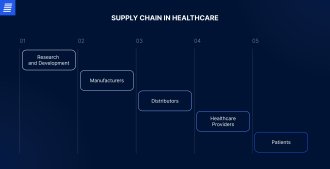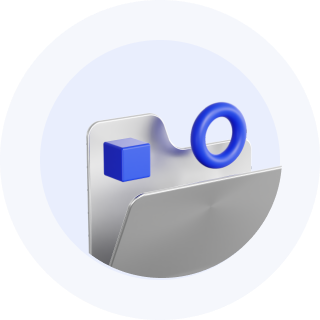
Contact us
Our team would love to hear from you.

Hospital management systems are software designed to keep records and control all aspects of a hospital’s operations. The essential part of the system is the document management component that keeps all data centralized. The system ensures the execution of hospital workflows thus assisting in providing quality services. An HMS facilitates regular activities, promotes communication, streamlines invoicing and billing, and offers other advantages to hospital staff and patients.
In this blog post, we will find out what major components make an HMS and describe their features and benefits. Let us take an HMS in a hospital as an example, but the system can also benefit other medical institutions.
A comprehensive HMS consists of several key components, or modules, that are designed to ensure efficient and continuous work of a healthcare facility.
An integrated appointment management module is mutually beneficial to everybody: patients save their time and money, doctors have steady shifts. Also, hospital equipment never stands idle.
The appointment management and scheduling module offers the following advantages:
Hospital staff management may be really challenging. The employee management modules allow carrying out all the necessary HR tasks within a single solution:
Getting paid for services in healthcare is a long and multi-step process that involves many participants. This journey cannot be shortened, but it can be accelerated by automating the billing process via implementing a billing system. Healthcare institutions may have billing software as a standalone system or, more often, as a part of an HMS or electronic health records (EHR).
Medical billing components offer healthcare providers instant access to any bill or claim. In these systems, one can see when a particular bill was sent to a health insurer and check its status to determine if it has been paid. Billing systems for healthcare institutions boast the following advantages:
Сlaims management modules allow managing insurance claims within a centralized system. This software can help insurers to lower claims management costs and improve customer and partner services.
Here are 3 main reasons why any healthcare-related business should integrate claims management:
A web-based application designed to streamline customer claims processing for a company working in geographically dispersed markets.
Supply chain management in healthcare includes obtaining and consumption of resources, management of supplies, and delivery of services and goods to end-users.
Below are the main advantages that a healthcare provider enjoys:


The laboratory management component is used to facilitate the work of labs which receive, process, and store numerous samples daily. Its main purpose is to improve the effectiveness of the laboratory work by automating tasks previously done manually.
Typically, these modules possess the following features:
Management of facilities encompasses monitoring and controlling hospital infrastructure with the aim to improve efficiency, safety, and security of a hospital.
This module covers several tasks:

Each hospital has its own requirements and needs for HMS software. A tailor-made solution will not only satisfy these needs but also help practices streamline processes and improve patient care and outcomes. Here are some of the significant benefits of custom HMS development:
Adapting to hospital needs
With a custom HMS, a hospital gets a solution that is made considering brand policies, rules, and even colors. Hospitals can configure the system as necessary, create and assign user roles, and add required elements, ensuring that all the modules and features meet the requirements of a particular practice.
Allowing for system integrations
A custom solution allows for seamless third-party integrations and connections. Thus, it is easy for hospitals to create a unified ecosystem with a steady data flow and enhanced interoperability.
Providing scalability
When tailoring an HMS to a hospital’s needs, scalability plays a crucial role. A scalable solution for hospital management implies that with the hospital’s expansion, HMS will be able to handle the growing data volumes and number of users and patients in the system. Seamless scalability allows hospitals to add new functions and modules to the HMS, while also maintaining high system performance.
There are some technology trends that can help improve an HMS solution, facilitating hospital processes and workflows and supporting high-quality delivery of patient care.
Internet of medical things (IoMT)
IoMT establishes a network of connected hospital devices, enabling exchange of gathered and generated data. IoMT sensors and gadgets can be used in HMS for environment monitoring and asset management. This allows for sustainable resource consumption, such as electricity and water, effective maintenance of mission-critical systems and equipment, and inventory management for smart hospitals.
The role of AI in healthcare is increasing and is expected to grow globally from USD 26.69 billion in 2024 to around USD 613.81 billion by 2034. In HMS, AI integration can help optimize resource allocation and automate administrative tasks, including appointment scheduling, insurance claims processing, and management of medical records.


Robotic process automation (RPA)
Unlike AI that is designed to simulate human intelligence, RPA replicates human-directed tasks, minimizing the necessity of human interference. Yet, AI and RPA can be used in tandem. In hospital management, RPA tools can be used to process patient blanks, insurance forms, payments, claims, and other documents, assist in appointment scheduling, and facilitate data entry, making it quicker and more accurate. Ultimately, this technology promotes streamlined, error-free administrative processes while also improving patient and staff experience.
A telemedicine solution integrated into an HMS adds new opportunities for patient care management. This technology allows for remote consultations, monitoring, and support, enhancing accessibility, reducing healthcare costs, and making care delivery more efficient. Combined with IoMT wearables, telemedicine can help healthcare providers track patients’ conditions and timely provide remote care, reducing readmissions and improving patient outcomes. It can also aid in collecting valuable patient data for enhanced diagnosing and treatment.
In this blog post, we have mentioned the major components of a hospital management system, but the set of modules may vary, for instance, for specialized clinics (dentistry, neurology, podiatry, cardiology, etc.), for healthcare networks, or for institutions which provide their own insurance plans.
If you need to build custom hospital management software and look for a reliable provider, drop us a line. Custom healthcare software development is our top priority, and we will be happy to share our two-decade expertise with you.

Custom HMS solutions can be integrated with third-party services, while ready-made systems can be limited in these capabilities.
The cost of custom hospital management software development varies depending on the complexity of the projects, required modules and functionality, integrations, advanced features, including reporting and analytics, necessary security measures, and more. To get a project estimate and launch your project, contact our team.
All the information security guidelines and standards are defined by global and local laws. These include ISO 27001, an international framework for information security, HIPAA in the US, and GDPR in the EU. The standards describe requirements for data handling, access, and disclosure and include measures such as access control, data encryption and backup, and employee training and awareness.
Can’t find the answer you are looking for?
Contact us and we will get in touch with you shortly.
Our team would love to hear from you.
Fill out the form, and we’ve got you covered.
What happens next?
San Diego, California
4445 Eastgate Mall, Suite 200
92121, 1-800-288-9659
San Francisco, California
50 California St #1500
94111, 1-800-288-9659
Pittsburgh, Pennsylvania
One Oxford Centre, 500 Grant St Suite 2900
15219, 1-800-288-9659
Durham, North Carolina
RTP Meridian, 2530 Meridian Pkwy Suite 300
27713, 1-800-288-9659
San Jose, Costa Rica
C. 118B, Trejos Montealegre
10203, 1-800-288-9659